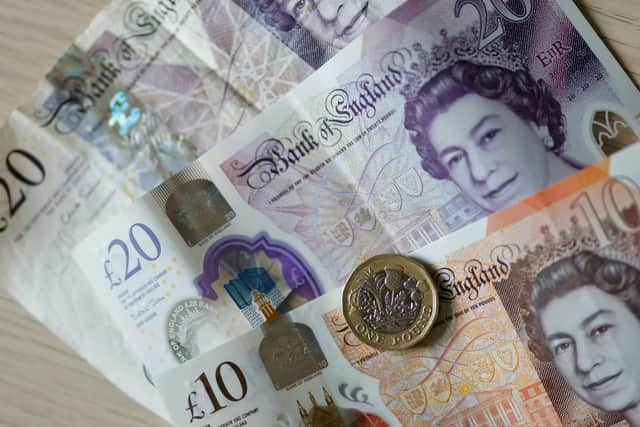Salary calculator: how big a pay rise you need in Sheffield to keep up with UK inflation
and live on Freeview channel 276
That was up from an already high seven per cent in March.
What is inflation?


Inflation is the term we use to describe the increase in prices over time.
How quickly those prices go up is called the rate of inflation.
What does a higher inflation rate mean for me?
Advertisement
Hide AdAdvertisement
Hide AdWhat a higher inflation rate means for your personal finances depends on how much you earn.
You can use our salary calculator to figure out how much of a pay rise you’d need to keep up with inflation - and how much of a pay cut you’d be taking if you’re unable to get a pay rise.
Please note: the figures do not take account of increased National Insurance contributions in April 2022.
What does the inflation rate mean for someone earning £15,000 a year?
Advertisement
Hide AdAdvertisement
Hide AdThe monthly take home pay for someone earning £15,000 is £1,152.97.
This means that you’d need to earn £1,256.68 a month to keep up with the rate of inflation - or else see a pay cut of £103.68 a month.
What does the inflation rate mean for someone earning £20,000 a year?
The monthly take home pay for someone earning £20,000 is £1,431,10.
Advertisement
Hide AdAdvertisement
Hide AdThis means that you’d need to earn £1,559.67 a month to keep up with the rate of inflation - or else see a pay cut of £128.67 a month.
What does the inflation rate mean for someone earning £25,000 a year?
The monthly take home pay for someone earning £25,000 is £1,709.21.
This means that you’d need to earn £1,862.67 a month to keep up with the rate of inflation - or else see a pay cut of £153.67 a month.
Advertisement
Hide AdAdvertisement
Hide AdWhat does the inflation rate mean for someone earning £30,000 a year?
The monthly take home pay for someone earning £30,000 is £1,987.34.
This means that you’d need to earn £2,165.67 a month to keep up with the rate of inflation - or else see a pay cut of £178.67 a month.
What does the inflation rate mean for someone earning £35,000 a year?
Advertisement
Hide AdAdvertisement
Hide AdThe monthly take home pay for someone earning £35,000 is £2,265.47.
This means that you’d need to earn £2,468.66 a month to keep up with the rate of inflation - or else see a pay cut of £203.66 a month.
What does the inflation rate mean for someone earning £40,000 a year?
The monthly take home pay for someone earning £40,000 is £2,543.58.
Advertisement
Hide AdAdvertisement
Hide AdThis means that you’d need to earn £2,772.75 a month to keep up with the rate of inflation - or else see a pay cut of £228.75 a month.
What does the inflation rate mean for someone earning £45,000 a year?
The monthly take home pay for someone earning £45,000 is £2,821.72.
This means that you’d need to earn £3,075.75 a month to keep up with the rate of inflation - or else see a pay cut of £253.75 a month.
Advertisement
Hide AdAdvertisement
Hide AdWhat does the inflation rate mean for someone earning £50,000 a year?
The monthly take home pay for someone earning £50,000 is £3,099.85.
This means that you’d need to earn £3,378.75 a month to keep up with the rate of inflation - or else see a pay cut of £278.75 a month.

